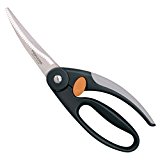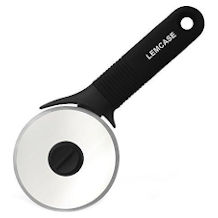Food processor purchasing advice: how to choose the right product
- The most important facts in brief
- Food can be chopped into very small pieces within a short time and without much effort.
- Depending on the power, the appliances can also chop solid ingredients such as block chocolate and ice cubes.
- Choppers are available in two different versions: as manual devices with a pull cord and as electric models with a motor.
- Above all, criteria such as the capacity, the number of blades and the power should be considered when buying.
Quick and easy shredding
The word “chopper” suggests the main function of the product. It is an appliance that chops food. Thanks to the time saved and the little effort required, food choppers are particularly practical and helpful kitchen appliances.
One reason why many people open the delivery service app at the end of the day is lack of time. Yet freshly cooked food is often the better choice, also from a health perspective. In this respect, you should rather use appliances that help you in the kitchen instead of leaving the preparation of the food in other hands. When you cook yourself, you always have an eye on the ingredients you are using. In addition, with a chopper you bypass tedious tasks such as chopping onions.
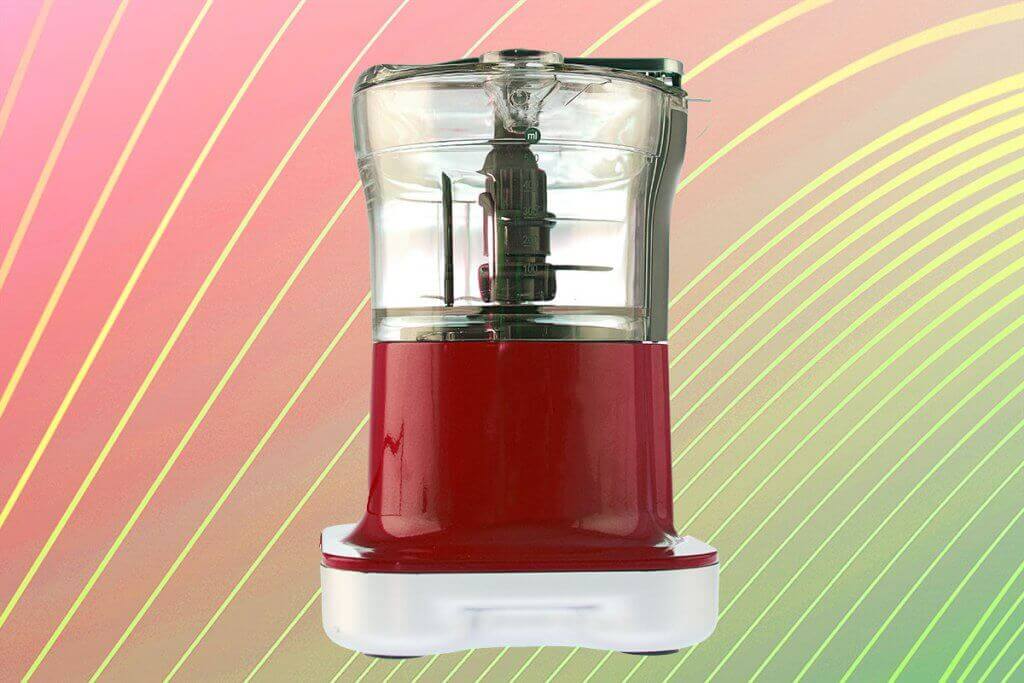
What is a food chopper?
Choppers are electrically or manually operated kitchen appliances with which you can quickly and easily chop food. Those who like to cook and prepare many dishes themselves benefit from a much simplified cooking process with a chopper, because chopping vegetables and other ingredients saves time and energy. In addition, choppers are very helpful for people who can only eat finely prepared food due to a special diet or physical limitations – for example, due to weaknesses in swallowing caused by illness or age-related swallowing difficulties. Still others are physically unable to wield a knife and cut hard foods as finely as possible by hand.
Advantages and disadvantages of a food chopper
Those who like to cook for themselves and their loved ones but don’t want to spend hours in the kitchen to do so will benefit from a food chopper, which speeds up the cooking process. The results also tend to be better because the chopped material is the same size. Another significant advantage is the optimised safety conditions: Those who use a shredder reduce the risk of cutting injuries. In addition, manual shredding with a knife is tiring, especially in the long run and with larger quantities. Although the choppers are very handy, the larger models in particular require storage space in the kitchen. Electric models also consume electricity and should only be used with extreme caution.
Pro points
- Very fine cutting results
- Significant time saving
- Uniform results
- Increased safety
- Reduced effort
Drawbacks
- Space requirement
- Power consumption
Design and differences
Some choppers look like stand mixers. But how are the household appliances constructed, what are the differences and how are the models similar – apart from the result, because that is just as comparable in all choppers as the way they work.
How are shredders constructed?
Shredders consist of a container, in which the blades are located, and a lid. The collection container placed underneath usually has a rubberised underside, suction cups or small feet to ensure a safe stand. The blades are fixed in a holder and then placed on the container together with the lid. In this way, the blades can rotate freely in the container. They can also be removed and cleaned or replaced at any time. Manual choppers have a cord that is connected to the cutting elements and a handle that you have to pull to make the blades rotate. In electric devices, a motor is built into the attachment or lid. They are powered by a cable, so you can start the chopper at the touch of a button – similar to blenders.
Overview of terms
The product name “shredder” is often given the suffix “multi” or “universal” by manufacturers. The term “kitchen shredder” also appears in this context. Although the same devices are meant, it is worth taking a closer look at the range of functions.
Manual versus electric models
To start the blades on manual models, you have to pull a cord that usually runs through the lid. The more often and faster you pull, the finer the results. While such choppers work wirelessly, i.e. without electricity, electric versions require a connection to the mains. On the other hand, electric shredders are easier to operate because you only have to press one button. The longer you press the button, the more frequently the blades rotate. In addition, the operation can be done one-handed compared to manual devices.
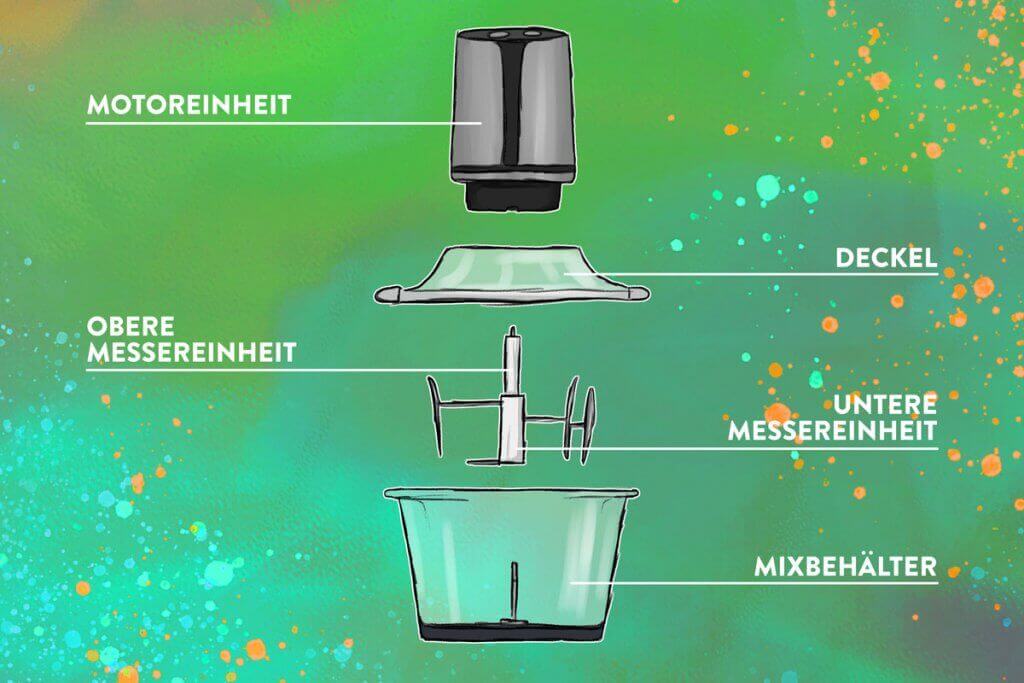
What criteria should be considered when buying?
Because the food to be cut is in the container before and during processing with the chopper, the capacity and material are relevant. For the actual work, the division and number of blades are important. For electric appliances, the power and speed levels are also important. Criteria such as weight and any protective functions round off the purchase decision.
Size of the container
Manufacturers specify the capacity either in millilitres or litres. The more food you want to chop in one go, the larger the container should be. If you are cooking for your entire family, a container with a large volume is therefore a good idea, so that all the cooking ingredients can be processed in one go. The range is very wide: the capacity is usually between 300 and 2,000 millilitres. On average, it is about 500 millilitres. If you only occasionally chop an onion and a few cloves of garlic, a container with a small volume of 300 millilitres is sufficient. For large families and apartment communities that cook and eat together, on the other hand, an appliance with a container that holds at least 1,000 millilitres is recommended.
Container material
The container of a food chopper is usually made of plastic, glass or stainless steel. A model made of stainless steel or plastic is more break-resistant than a glass container, but the latter is more resistant to scratches. In addition, the transparent material has the advantage that you can see the result without having to lift the lid. A plastic container is the cheapest, but the material quickly absorbs odours and is not always dishwasher-safe.
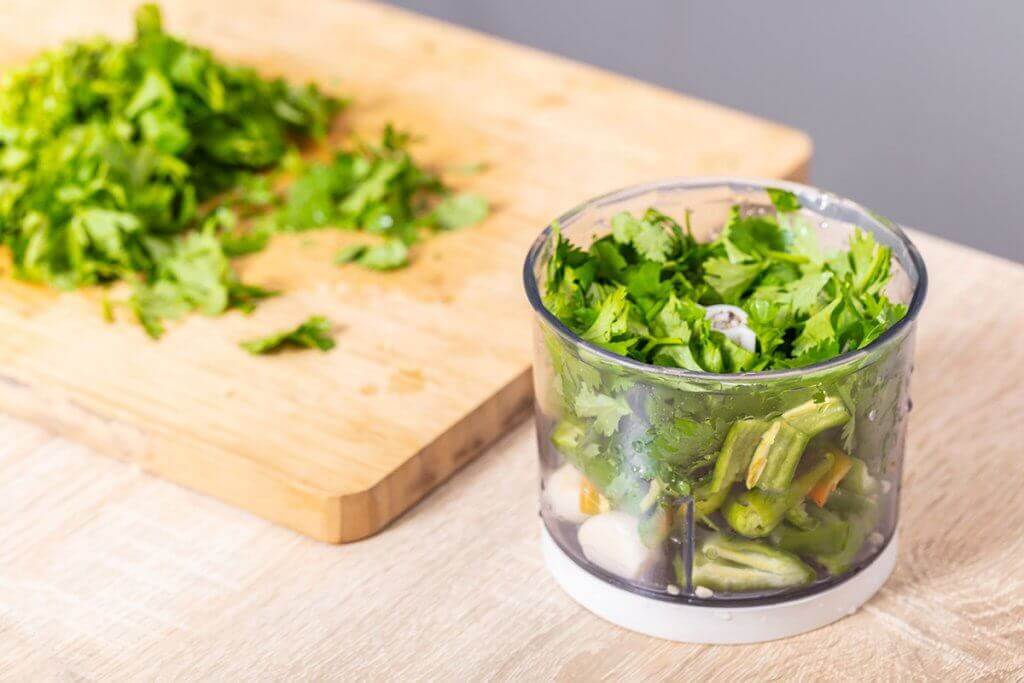
Blades
The blades are the heart of a chopper, as nothing could be chopped without them. Mostly, the blades are made of stainless steel. The assumption that multiple blades give a better result is not always correct. Two blades can shred just as effectively as four or more blades. At most, the duration of the process is longer, as several blades shred the contents of the container more quickly. The arrangement and length of the blades are clearly more important: The blade surface should be just above the base of the container, at best only a few millimetres, so that no food can collect underneath. The tips should be as close as possible to the inside of the container so that no leftovers are left on the outside of the container rim.
Power
The power in watts only matters if you choose an electric food chopper. Some devices have a particularly high power value of up to 1,000 watts, while particularly inexpensive shredders have a power value of less than 100 watts. For normal use in the kitchen at home, we recommend an average with a slight downward tendency – i.e. between 300 and 500 watts.
If you don’t want to do without electric operation, but want to keep power consumption low, you should opt for a device with a lower output of around 200 watts. The result is not as fine as with more powerful choppers, but you enjoy the advantage of not having to operate the appliance manually. Low-power choppers are usually sufficient for chopping onions, garlic and similar foods. However, if you want to process nuts, hard vegetables or block chocolate, you should reach for a more powerful device.
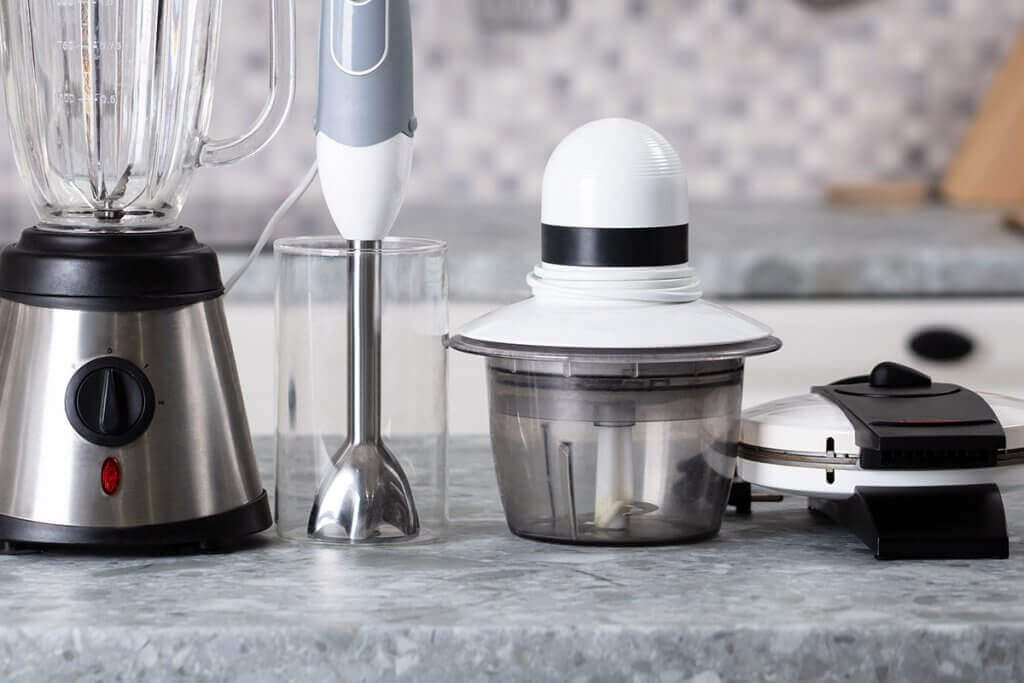
Speed levels
Electric choppers usually offer one or two speed settings. Two speeds are generally better because you can determine the fineness of the food yourself. In addition, you can adjust the speed to the food: The slower level processes softer ingredients and the fast level chops hard foods as effectively as possible.
Weight
The weight in kilograms is less important compared to the other purchase criteria, as choppers are intended for stationary use and may need to be stored in a cupboard at most. The larger and more powerful shredders are, the heavier they are. Most models weigh between 0.5 and 2.0 kilograms. Manual models tend to be lighter and can therefore be conveniently transported if needed.
Well protected is half shredded
To prevent users from injuring themselves during work, electric shredders are equipped with protective mechanisms. These include overheating protection, which prevents the appliance from getting too hot, and a brake function. The latter stops the rotation of the blades as soon as the lid opens during operation.
Tips for use and cleaning
As useful as choppers are in theory, you should not use them to process all foods. Since the appliances come into contact with food, you should also clean them regularly and remove food residues.
What foods can be processed with a food chopper?
The most common foods that are processed in a food chopper include onions and garlic. One advantage is that you protect your eyes and fingers from the smell. It is also possible to process vegetables and fruits as well as herbs, seeds and grains – this includes harder vegetables such as carrots and potatoes. The firmer the food, the more power is required – this applies to nuts, chocolate and parmesan, for example. Some appliances can even crush frozen ice and make crushed ice. Make sure that the appliances are explicitly suitable for this, otherwise the blades may suffer. Choppers not only process individual ingredients, but are also ideal for blending foods, so you can create spreads, pestos or dressings directly in the container.
Culinary tip
If the chopper is able to crush ice, you can also use it to process frozen fruit. Berries are particularly suitable here, so that you can use the mixture for cakes or smoothies, for example. If you crush the frozen fruit together with the ice cubes, you get crushed ice with a fruity taste – a recommendation for the summer.
Important accessories
If you want to prepare cream and mayonnaise, you should pay attention to the appropriate accessories. With special inserts such as a whipping and emulsifying disc, you can expand the range of functions of the chopper. Whipped egg whites can be created with a special whisk or whisk, both of which can also be placed in the container instead of the blades.
A spatula makes it easier to remove the chopped food from the container. If a separate freshness lid is included, you can seal the container and its contents airtight and place it directly in the refrigerator.
Cleaning food choppers
Odours quickly settle inside the container – depending on the material, discolouration may also occur. To maintain a certain standard of hygiene, thorough cleaning is recommended after each use. Individually removable elements can usually be cleaned in the dishwasher, but careful hand cleaning is often advisable. While the container is usually dishwasher safe, the blades are only suitable for the dishwasher in some cases. To prevent the blades from becoming dull, you should always clean them by hand, even if they are dishwasher-safe. Hot water and washing-up liquid usually remove all food residues.
The lid does not belong in the dishwasher, neither for manual nor for electric appliances. Electric models would be damaged due to the built-in technology. The lid of manual food choppers has a pull cord, so it is not advisable to rinse it with water or submerge it. Water can get inside through the opening of the pull cord. If this should happen, you can follow this trick: Pull out the pull cord completely and fix it to the opening with a clothes peg so that the cord does not snap back. This way, the water can run out of the housing and the cord can dry.

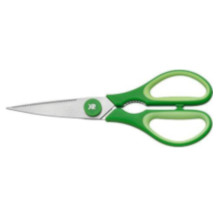
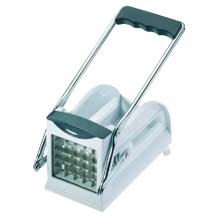
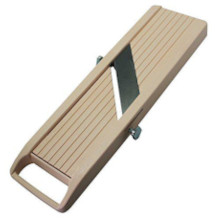
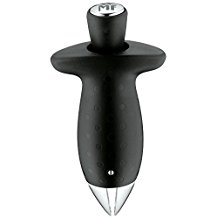

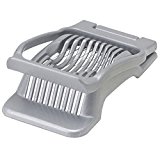
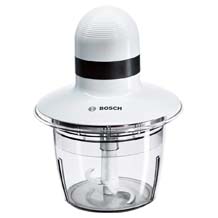
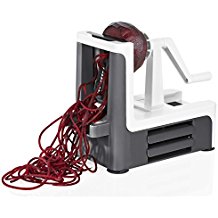
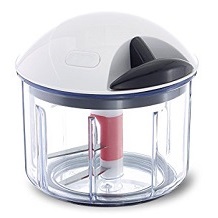

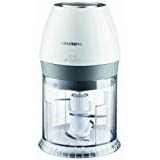

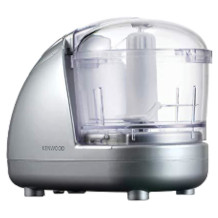
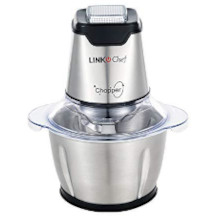

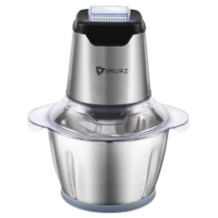
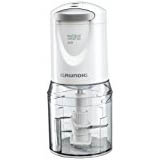
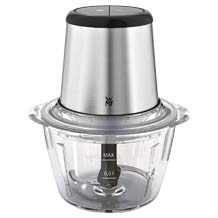
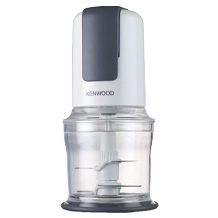
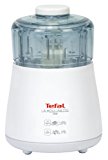
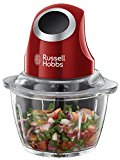
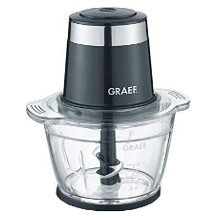

 2,172 reviews
2,172 reviews

